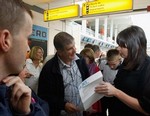
- Image by Getty Images via Daylife
The Middle Seat Terminal blog reports that the rate at which passengers were bumped in the second quarter of this year increased forty percent compared with the same period a year ago. As carriers have slashed capacity to the bone, and with overbooking a common practice, there are too many people crammed onto flights.
Planes are not only more full, due to this capacity crunch, but people are less willing to give up their seats. Part of this is the fact that there are fewer flights to their destination and those flights are, on average, more full. That makes getting where you need to be in a timely fashion more difficult if you lose your initial seat. However, during the 1970s and 1980s, bumping rates were routinely four times as high as today’s rate, which is why the DOT is not yet getting concerned.
Federal rules allow airlines to sell more tickets than there are seats on a plane because of a certain no-show percentage. What other industry is allowed to sell more of a product or service than it can supply? And it often costs less, even after the DOT raised the compensation guidelines, to compensate those it inconveniences than to not oversell. And the airlines need the money. Business travel is down and leisure passengers show up more consistently than business ones.
And as they bump more passengers, airlines are giving away less to induce passengers off their planes. Alaska Airlines tried to cut the number of vouchers it issued by switching from giving passengers a free flight to either a $200 voucher on a shorter flight or $400 one on a longer one and saw its bumping rate increase 269%. It upped the lower tier to $300 and things are starting to come down a bit.
You could, of course, pick airlines like JetBlue and Virgin America, neither of which oversell. JetBlue involuntarily denied boarding at a rate of 0.01 per 10,000 for the second quarter, compared to the top offender, US Airways, at 1.88. And regional flights, which are operated under contact, are usually the biggest offenders.
Some recommend buying tickets only for flights on which you can reserve a seat and to print your boarding pass early to lay claim to that seat. But that is not a hard and fast rule, although airlines will usually bump people in order of check-in. The key is not to arrive and check-in too close to departure time.
Airlines aren’t exactly being forthcoming about your rights in the event of denied boarding either. Spirit Airlines was fined $375,000 for not complying with rules governing compensation. The DOT’s Aviation Enforcement Office found that Spirit bumped passengers from oversold flights but did not provide compensation or a written notice of their rights to compensation, as required. They also also cited Spirit for referring to DOT and FAA regulations when responding to consumer complaints even though the complaints did not concern DOT or FAA rules.